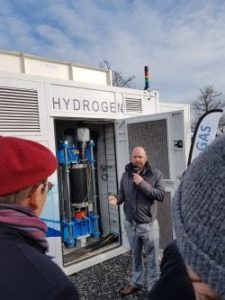Origins of Hydrogen: Where Is this Energy Source Sourced?

Introduction
Hydrogen is emerging as a versatile and sustainable energy source, but a fundamental question is: where is hydrogen obtained from? In this article, we will explore the sources and methods used to produce hydrogen, highlighting the importance of hydrogen production in the transition to a cleaner and more sustainable future.
1. Hydrogen Production from Natural Gas
One of the most common sources of hydrogen is natural gas. Hydrogen can be obtained through a process called natural gas reforming, in which natural gas undergoes chemical reactions to produce hydrogen and carbon dioxide. Although widely used, this method generates carbon emissions and is not entirely sustainable from an environmental perspective.
2. Hydrogen Production through Water Electrolysis
Water electrolysis is a process that uses electricity to split water into hydrogen and oxygen. This approach is highly sustainable when powered by electricity from renewable sources such as solar or wind. Water electrolysis is considered one of the cleanest ways to produce hydrogen and is pivotal in the transition to a green hydrogen economy.
3. Hydrogen Production from Biological Sources
Some microorganisms can produce hydrogen as a byproduct of their metabolic processes. This biological production of hydrogen is an emerging research focus that could offer a sustainable alternative for hydrogen production in the future.
4. Hydrogen Production from Biomass
Biomass, such as wood, agricultural residues, and algae, can be converted into hydrogen through gasification and pyrolysis processes. These methods harness organic materials to generate hydrogen and are considered part of the transition to a sustainable hydrogen economy.
5. Future Outlook
Hydrogen production is a critical link in the supply chain of this energy source. As cleaner and more sustainable technologies for hydrogen production develop, we are likely to see an increase in green hydrogen production, sourced from renewables and clean processes.
Conclusion
Hydrogen is a versatile energy source with applications in various industries, from mobility to energy production. Where hydrogen is obtained is a crucial factor in terms of its sustainability and environmental impact. As we move towards a cleaner and more sustainable future, hydrogen production from renewable sources and clean processes will play a crucial role in harnessing the potential of hydrogen as the energy source of tomorrow.

























